|
|
|
Sort Order |
|
|
|
Items / Page
|
|
|
|
|
|
|
| Srl | Item |
| 1 |
ID:
157983


|
|
|
|
|
| Summary/Abstract |
The European Union Police Mission for the Palestinian Territories (EUPOL COPPS) was established in 2006 to contribute to the establishment of effective policing in support of an independent and democratic Palestinian state. EUPOL COPPS is often commended for its contribution to the professionalization of the Palestinian security sector under local ownership. Drawing on 40 interviews, we argue that the mission can be considered effective and locally owned only from a narrow technocratic perspective, which denies the political reality of continued occupation and absence of democracy. A broader analysis, which includes the voices of ordinary Palestinians, reveals that EUPOL COPPS contributed to the professionalization of authoritarian policing under continued Israeli occupation. Our findings show the limits of technocratic approaches to peacebuilding interventions and call for a stronger engagement with the ultimate beneficiaries of peacebuilding missions.
|
|
|
|
|
|
|
|
|
|
|
|
|
|
|
|
| 2 |
ID:
157981
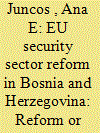

|
|
|
|
|
| Summary/Abstract |
Attempts to explain the failure to reform the security sectors in post-conflict countries have often resorted to two sets of explanatory factors: international and local factors. This article seeks to move from that unhelpful dichotomy to an explanation linking both factors. Drawing on a Foucauldian approach and the concept of “counter-conduct,” it examines the rationality and practices of European Union (EU) governmentality and how governing technologies are resisted and reversed by local elites involved in security sector reform (SSR). Instead of understanding power and resistance as binary opposites, this article argues that counter-conduct can be conceived as implicated in the very relations of power that it seeks to resist. To tease out these relations, the article analyzes the EU's efforts in SSR in Bosnia and Herzegovina, where it identifies four forms of counter-conduct: upholding European standards, using the local ownership trap, simulating reforms, and lowering the bar.
|
|
|
|
|
|
|
|
|
|
|
|
|
|
|
|
| 3 |
ID:
157979
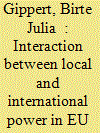

|
|
|
|
|
| Summary/Abstract |
This article explores the interaction between local and international power structures in EU peacebuilding. While citizens in a state only face order from one authority (the state), local actors in a peacebuilding context are subject to orders from two institutions (the domestic state and the peacebuilding mission). This article explores the nature of interactions of these two institutions and their effect on local police officers’ compliance and resistance. Specifically, it analyzes the example of the police restructuring process in Bosnia and Herzegovina. It demonstrates that the choices of local officers to comply or resist depended on whether the interactions between the EU Police Mission and the local police organization were positive and mutually supportive, or whether they were competitive and contradictory. The findings of the article contribute to the debates on the role of local power and the importance of local legitimacy in peacebuilding.
|
|
|
|
|
|
|
|
|
|
|
|
|
|
|
|
| 4 |
ID:
157984
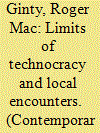

|
|
|
|
|
| Summary/Abstract |
This article is the conclusion to a special issue that examines the European Union (EU), peacebuilding, and “the local.” It argues that technocracy—particularly EU technocracy—shapes the extent to which local actors can hope to achieve ownership of externally funded and directed peace support projects and programs. Although some actors within the EU have worked hard to push localization agendas, a number of technocracy linked factors come together to limit the extent to which the EU can truly connect with the local level in its peace support activities. While the EU and other international actors have invested heavily into capacity building in conflict-affected contexts, the EU’s own capacity has not necessarily been built to address the scalar problem of accessing the local in ways that are meaningful.
|
|
|
|
|
|
|
|
|
|
|
|
|
|
|
|
| 5 |
ID:
157980
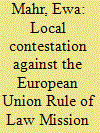

|
|
|
|
|
| Summary/Abstract |
This article examines local contestation against the European Union Rule of Law Mission in Kosovo (EULEX), manifesting itself in local actors publicly demanding a change in the mission’s mandate and/or its operations. The article investigates how EULEX’s actions and its effectiveness are perceived and reacted upon by the local actors. It shows that local contestation is mainly fueled by (1) conflicting sovereignty claims by the majority Albanians and the minority Serbs; (2) the understanding of sovereignty by parts of society as entailing exclusive authority; and (3) dissatisfaction with the mission’s effectiveness. By addressing EULEX from a bottom-up perspective—that of the local actors—the article underlines the limitations of EU policies in post-conflict Kosovo.
|
|
|
|
|
|
|
|
|
|
|
|
|
|
|
|
| 6 |
ID:
157978
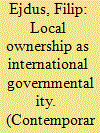

|
|
|
|
|
| Summary/Abstract |
While some Foucault-inspired studies construe local ownership in international interventions as a form of liberal governmentality that aims to govern through freedom, others lambast it as an illiberal governmentality that is likely to be resisted because it undermines local autonomy. However, we still do not know what is the rationality behind local ownership, how it is being operationalized, and why a principle that aims to govern through freedom ends up curtailing it. I argue that local ownership, echoing the colonial principle of indirect rule, is driven by the rationality of advanced democracies on how best to govern global insecurities at a distance. Consequently, ownership is operationalized as responsibilization for externally designed objectives. This often gives rise to local resistance which undermines international efforts to achieve ownership. I illustrate my arguments with evidence from the EU Mission on Regional Maritime Capacity Building in the Horn of Africa (EUCAP Nestor).
|
|
|
|
|
|
|
|
|
|
|
|
|
|
|
|
| 7 |
ID:
157982
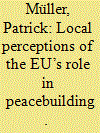

|
|
|
|
|
| Summary/Abstract |
Perception research can make a valuable contribution to the study of the local dimension in EU peacebuilding. The conceptual framework developed in this article distinguishes between perceptions of the “legitimacy,” “effectiveness,” and “credibility” of EU peacebuilding practices, which are crucial factors for successful peacebuilding. Relying on the case of the EU’s support for security sector reform (SSR) in Palestine, this article shows that local stakeholders—which participate in various EU-sponsored training and capacity-building programs—display considerable support for liberal peacebuilding norms. Yet, perceived discrepancies between the EU’s peacebuilding rhetoric and its SSR activities have severely undermined the potential of the EU’s liberal peacebuilding model in the eyes of Palestinian stakeholders. Critical local perceptions are frequently articulated with reference to the EU’s own liberal peacebuilding discourse, pointing to a lack of inclusiveness of the SSR process and deficits in terms of democratic governance and the rule of law.
|
|
|
|
|
|
|
|
|
|
|
|
|
|
|
|
| 8 |
ID:
157977


|
|
|
|
|
| Summary/Abstract |
Since the early 2000s, the “local turn” has thoroughly transformed the field of peacebuilding. The European Union (EU) policy discourse on peacebuilding has also aligned with this trend, with an increasing number of EU policy statements insisting on the importance of “the local.” However, most studies on EU peacebuilding still adopt a top-down approach and focus on institutions, capabilities, and decision-making at the EU level. This special issue contributes to the literature by focusing on bottom-up and local dynamics of EU peacebuilding. After outlining the rationale and the scope of the special issue, this article discusses the local turn in international peacebuilding and identifies several interrelated concepts relevant to theorizing the role of the local, specifically those of effectiveness, ownership, and resistance. In the conclusion, we summarize the key contributions of this special issue and suggest some avenues for further research.
|
|
|
|
|
|
|
|
|
|
|
|
|
|
|
|
|
|
|
|
|